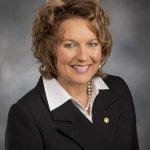I share the frustrations of many that the Legislature adjourned July 20 after a record 193 days in session without passing a capital construction budget.

This $4 billion budget funds statewide infrastructure and projects, including school construction, playfields, parks, water and sewer projects, and acquisition of land for recreational use and preservation. Locally, there are nearly $40 million in projects awaiting capital budget funding, including $5.2 million for development of Clark College’s satellite campus in Ridgefield. These job-creating projects are important to our local communities and matter to all of us. But so does water.
There’s a deeper frustration over the House’s refusal to pass a permanent Hirst fix.
Last October, in Whatcom County vs. Hirst, Futurewise, et al. (Hirst decision), the Washington State Supreme Court ruled Whatcom County failed to protect water resources under the Growth Management Act. This extremely flawed decision means rural and suburban landowners with undeveloped properties may never be able to drill a well on their property unless they can prove not a single drop of water would be removed from instream flows. An instream flow is a water right for a river or a stream that protects and preserves instream resources like fish habitat.
It’s important to note that water drawn from private, single-family wells uses less than one percent of all the state’s water, yet this miniscule group is being targeted as if it is the largest water user. Most small landowners can’t afford to hire an expensive hydrologist for underground tests. Neither can county governments, so some counties have stopped granting building permits. Without water, banks won’t issue property loans, development is blocked, and these lands lose their market value, devastating rural families’ investments, retirement plans and dreams for a new home.
Urban centers like Seattle draw their water from rural underground aquifers, allowing their residents to build homes, apartments and commercial centers. Yet, rural residents could be denied access to their own water being delivered to cities. Futurewise, the extreme environmental group behind the Hirst decision, turned back 100 years of water law so they could shut down rural development and force people to live in cities. It truly is the most severe urban attack against rural private property rights in Washington’s history.
Make no mistake — city dwellers are not immune from Hirst repercussions. As rural property values plummet, property taxes will be shifted to the rest of us who remain standing. That means all of us with access to water will pay higher property taxes if Hirst is not reversed.
What does this have to do with the capital budget? My House and Senate Republican colleagues and I do not believe it is fair for the state to use taxpayer dollars for its project development, including water infrastructure, while denying those same taxpaying families from developing their own rural properties because they cannot drill a well. It’s also not fair Seattle residents get all the water they want from rural lands, but rural families have to beg for water.
A measure to permanently roll back the Hirst decision, Senate Bill 5239, passed the Senate four times with strong support from House Republicans. However, urban House leaders siding with Futurewise have refused to bring the bill to the floor for a vote. Instead, they offered a temporary 24-month delay and insisted tribes be able to veto any proposed wells.
Republicans in the House and Senate are firmly defending rural property owners and will never cede those water rights to special interests. We insist a permanent fix that reverses Hirst must be in place before we give final approval to the financing of a capital budget.
Frankly, there’s no good reason why we cannot have both — a permanent Hirst fix and a capital budget. It would require another special session. However, this issue is so important for the future of ONE Washington, my fellow Republican lawmakers and I are ready to return to Olympia at a moment’s notice once urban legislators agree to a permanent solution so that we can pass the Hirst fix AND financing of a capital budget. All Washington citizens, urban and rural, deserve no less than both.
Rep. Liz Pike, R-Camas, is the assistant ranking Republican on the House Local Government Committee and represents the 18th Legislative District.




